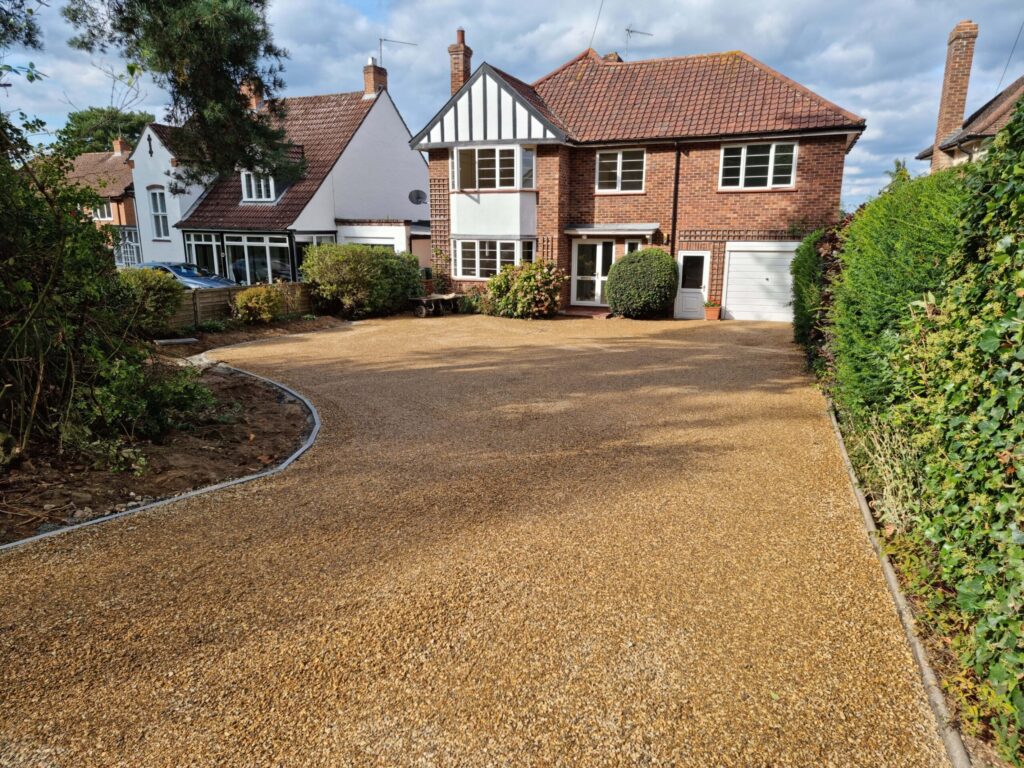Tar & Chip vs Gravel: Making Informed Choices for Commercial Areas
Introduction: Regarding surfacing commercial areas, the choice between tar and, chip and gravel can be pivotal. Each option has its unique characteristics, benefits, and drawbacks. In this blog post, we’ll compare tar and chip surfaces with traditional gravel surfaces, helping you make an informed choice for your commercial area. At Bury St Edmunds Driveway Solutions, we specialise in creating durable and attractive commercial surfaces, and we’re here to guide you through the decision-making process.
Tar & Chip: The Modern Alternative
Tar and chip, also known as chip seal, offers a modern and versatile alternative to traditional gravel surfaces. Here’s why it might be the right choice for your commercial area:
- Durability: Tar and chip surfaces are highly durable and withstand heavy traffic and weather conditions. The combination of tar and aggregate creates a strong and resilient surface.
- Low Maintenance: Once installed, tar and chip surfaces require minimal maintenance. Periodic resealing can extend their lifespan, making them a cost-effective choice in the long run.
- Aesthetic Appeal: Tar and chip driveways offer a more finished and polished appearance than loose gravel. They come in various colours and aggregate sizes, allowing customisation to match your commercial area’s aesthetics.
- Reduced Dust: Tar and chip surfaces significantly reduce dust compared to traditional gravel, creating a cleaner environment for your commercial space.
- Excellent Traction: The textured tar and chip surface provide excellent traction, enhancing safety for pedestrians and vehicles.
Gravel: The Traditional Option
Gravel surfaces have been used for centuries and are popular for commercial areas. Here are some considerations for gravel:
- Cost-Effective: Gravel is generally more affordable upfront compared to tar and chip. It’s an economical option for large commercial areas.
- Easy Repairs: If a section of the gravel surface becomes damaged or uneven, replacing or levelling the affected area is relatively simple.
- Permeable: Gravel is a permeable surface, allowing rainwater to drain through it, which can be beneficial for managing stormwater runoff.
- Maintenance: While gravel is easy to repair, it does require regular maintenance to keep it level and free of weeds.
- Dust and Erosion: Gravel surfaces can generate dust and suffer from erosion over time, which may require ongoing maintenance and dust control measures.
Choosing the Right Surface
The choice between tar and chip and gravel for your commercial area depends on your specific needs and priorities. Consider the following factors:
- Budget: Tar and chip surfaces may have a higher initial cost but offer long-term durability and a more finished appearance. Gravel is often more budget-friendly upfront.
- Aesthetics: If aesthetics are crucial for your commercial area, tar and chip offer a polished look with customisation options.
- Maintenance: Think about your maintenance preferences and resources. Tar and chip surfaces require less ongoing maintenance than gravel.
- Use and Traffic: Consider the amount and type of traffic your commercial area will experience. Tar and chip surfaces are well-suited for heavy traffic, while gravel may require more frequent levelling and replenishing.
Conclusion: The choice between tar, chip, and gravel for your commercial area ultimately comes down to your specific needs, budget, and aesthetic preferences. At Bury St Edmunds Driveway Solutions, we can help you make an informed decision and provide professional installation for the surface that best suits your commercial area’s requirements. Whether you opt for the durability and polished appearance of tar and chip or the cost-effectiveness of gravel, we’ll ensure your commercial area receives a surface that meets your expectations and serves your business well.
Call us on: 01284 331 496
Click here to find out more about Bury St Edmunds Driveway Solutions
Click here to complete our contact form and see how we can help with your driveway needs.

